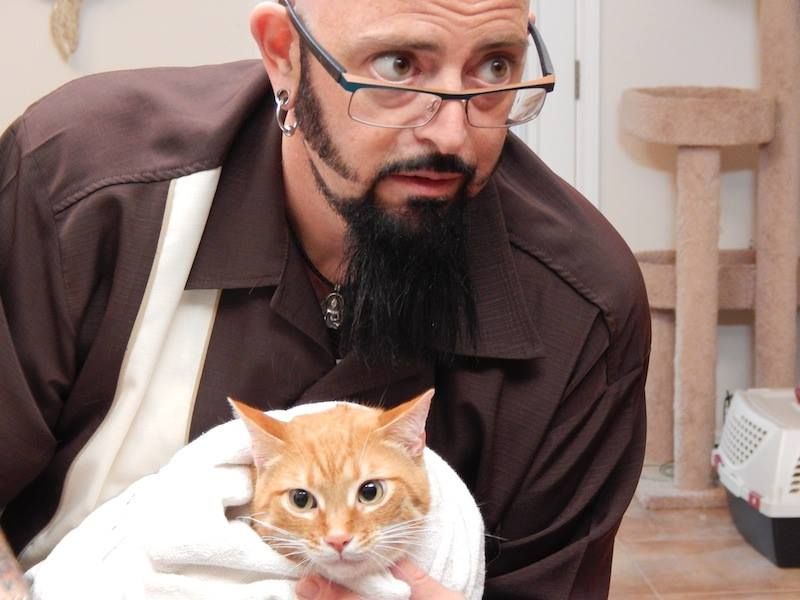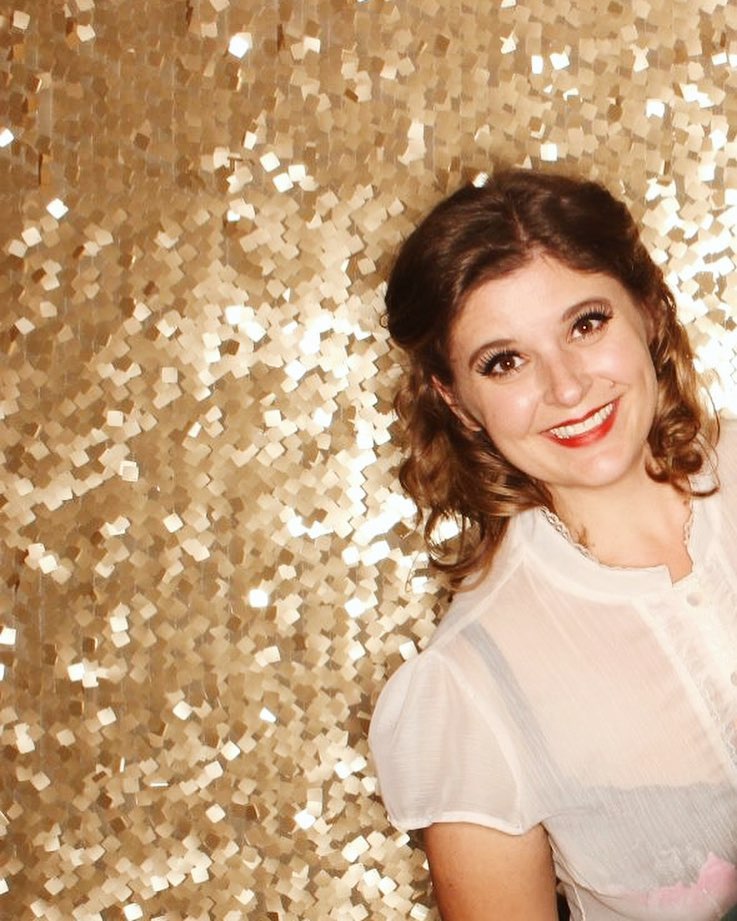
Even if you don’t have any cats at home or you stay away from reality television, there’s still a good chance that you’ve heard of Animal Planet’s hit show My Cat From Hell. Starring cat behaviorist Jackson Galaxy (yes, that’s his legal name—he changed it in his 20s), each episode chronicles a specific family and their troublesome cat. With its sixth season underway, the program addresses the popular stereotypes and misnomers pet owners have about not only caring for their feline friends, but about the communication needed to actually understand the furry creatures on an emotional level. With his instantly recognizable guitar case full of treats and toys, the tattooed Galaxy enters Los Angeles homes and spends days getting to know the pet owners and their ferocious felines, so he can offer advice and tricks on how everyone can coexist in harmony.

We all laughed last year when a Portland couple called 911 after their ferocious feline attacked and trapped them (and their baby) in the bathroom. Sure, the image was funny, but there is actually a deeply upsetting reality that underlies stories like this one. Often, pet owners become frustrated with their misbehaving pets and ultimately end up dropping them at a shelter, pawning them off on a friend, or just straight-up abandoning them. Galaxy helps families like this one, and so many others, bond with cats so the home can be a happy place. He essentially wants to work himself straight out of a job by showing as many people as he can that anyone can understand cats if they put the time and effort in.
Considering most of us in the JustLuxe office are fanatics for our pets, we were pretty excited when the opportunity to chat with Jackson came along. As much as we wanted to pick his brain regarding each of our kitty concerns (one with his overly emotional meowing and another with the tendency to pull his own fur out), it’s difficult for a behaviorist to give advice on a specific kitty without actually meeting the feline. So instead, Jackson challenged self-professed cat haters, chatted about keeping our egos in check, and dispelled the silly myth that cats misbehave out of revenge.

Mila Pantovich: With a background as an actor and musician, how did you end up with your own show? What was your path like to being a cat behaviorist?
Jackson Galaxy: I went into a shelter to scoop poop, wash cages and spend some time with animals. I had no idea [that] two weeks later, I’d be sitting in a room and the cats would converge on me. It was literally that dramatic. When it happens like that, anybody who has a heart for animals would [want to help]. Don’t forget, we’re killing a lot of animals, so how can I be of service here? So, I just dove in.
I started researching, admittedly very little information, and I started every waking minute watching them, bonding with them, and calling on my history—which, by the way, has nothing to do with science. I’m an artist […] and I know the inner workings of psyches and how to translate that into emotion; it worked.

Jackson Galaxy: Flash forward 10 years and I [had] left the shelter to see if I could make a living. I was [surviving] off of crackers for a couple years [laughs]. The way the show happened was that I moved out here to [Los Angeles] to be with the girlfriend I had at the time. Everybody knows somebody who’s in entertainment around here and somebody literally was like, “Oh my god, wait a minute. You? You work with cats?” They would follow me around and somebody saw me teach a class; it really was that serendipitous. I didn’t ever go out pitching a show; this is my life, they liked it, and boom!
Animal Planet loved the idea and trying to get advertisers to jump on board, I think, became the real challenge. “Hold on a second, do cat people actually spend money? Do they actually leave their dark basements?” The answer? Six seasons later [laughs]? Yes, they do.

MP: It seems like cat behaviorism is such a young profession that maybe still isn’t understood; is it becoming more common and do you think it’s getting easier to go into this line of work now?
JG: It makes me incredibly happy, honest to god. There have been times I’ll be doing an event and a little kid comes up to me and says, “When I grow up, I want to do what you do.” And you know me, I instantly start blubbering and crying, because it is one of the most beautiful things to think that we will be well taken care of.
As a profession, it’s still the Wild West. It is my hope as things continue that I will be able to specifically mentor and help people get set up […], because it will save lives. Right now it’s a little tough, but that’s not to say people shouldn’t do it. You can do exactly what I did. Spend time with a lot of animals, volunteer or work at a shelter, and be curious with a compassionate heart and you will get work. There is a large demand out there and that puts people above where I was living off crackers. People understand now that you can work with their cats and you don’t have to give up and rehome them.

MP: What do people misunderstand about cats the most? Is there an issue you come across more frequently than others? Like scratching, biting, bathroom accidents, etc.?
JG: That’s just a symptom [and] the reason for the symptom is that you don’t get them. Don’t forget that we are almost programed to get dogs, because we programmed them to be more human. Cats have just been along for the ride for thousands of years. They did a job, they did it well, so we were like, “Yeah, stick around.” It was only about 100 or so years ago that as a culture we said, “Wait a minute, if you want you can move in.” Then suddenly we’re all mad at them because we’re expecting them to pee in a box! It’s interesting in that respect. We consider them outside of us, inscrutable and aloof, and borderline b**chy. Again, that’s part of the overall job. If we want to stop killing these animals, we start right there with basic education. Your cat loves you, you just got to know what love looks like from a cat.

MP: What is the best way to start correcting bad/unwanted behavior in a cat? Is there something someone should do first to try and narrow it down?
JG: There’s always a good excuse to go to the vet. Always. We don’t, as a culture, take our cats to the vet and I’ve seen the craziest behavior in the world caused by a bad tooth. Cats work their butts off to hide pain—it keeps them alive in the wild—and so your best move is by ruling out [medical] cause. After that, […] where you start is getting to know cats. If you know them from that Meta place, you will then invest the time to get to know who your cat is and then you can stop the problem.
One of those things about making a show where I spend three separate days with these people and we shoot over 30 hours of footage and then we boil it all down to 22 minutes; everyone thinks that there's a formula. That you just put a Band-Aid on the cat and everything’s going to be good. It’s about you investing in the relationship and then the symptoms. I promise, over time the symptoms will be taken care of. That’s where you start.

MP: What are some common ways you see people trying to combat their cats behavior that aren’t helping (squirt bottle, double-sided tape on furniture, etc)? What’s the biggest issue with negative reinforcement?
JG: The spray bottle [and other forms of punishment] is systematic. It’s trying to push against them. You’ve got to understand that the first hurdle that you as a human have to overcome in order to successfully have a relationship with a cat is compromise. You have to meet them at the communicative fence. You can’t make them do anything. That, for us, [...] is completely unacceptable. “I will not subjugate myself to an animal, I don’t care how much I love them!”
So, the spray bottle is a perfect example of trying to push energy versus energy, and it will never work. […] What you do, as any good parent [would]—whether they’ve got two legs or four—if it’s unacceptable behavior, you say ”no.” Behind every no, [there] has to be a "yes." Just like with a child. It does not work just to take their crayons away from them. You have to give them an easel and you have to give them paint. But at the same time, you best put some plastic on the wall and make it so the crayons don’t stick!

JG: If you want, as a training tool, put double-sided tape on the leg of your couch so that when they go to scratch it, they go, “Ew, that’s gross.” But right next to it, you [better] give them a really strong, sturdy scratching post and say “yes.” And that’s thinking with your heart instead of your ego—because it is an ego thing. Some will say, “Heck no, if you don’t do what I’m telling you, you’re out!” And you’ve seen that played out over and over again on My Cat From Hell.
MP: What do you say to people who say that their cats will do things just to spite them?
JG: Someone [on my show] actually thought their cat was revenge puking. Thought their cat was throwing up on their belongings, and their belongings only. I was like, “Don’t you think—let’s just play this out—that the cat actually likes you, so the cat is spending time sitting on your stuff because it smells like you. Then the cat happens to get a hair ball and pukes. Isn’t that possible?” And they’ll say, “Oh my god, you’re right.” But it takes that moment of non-judgment of the human in order to get them to stop judging the cat. It’s really important that we, as animal people, educate, but educate compassionately. Every last thing that I do, […] is based around the efforts to stop killing these animals—cats, dogs, ponies, it doesn’t matter—and the way to do that is to not judge the people who hate them.

MP: It’s hard to imagine anyone hating cats.
JG: I will take the challenge from anybody. If you say, “I’m a dog person” or “I’m just not a cat person, I don’t like them,” I will find you that cat. That is a stone guarantee. All we’re looking for is […] taking the extra time to break down the stereotypes and as soon as we do that, they’re like, “Oh my god, where have you been all my life?” It doesn’t take much. We are compassionate at our core, we want to make connections—whether with animals or humans—it’s part of us. We just have to work against certain stereotypes of what it is to be a cat and what it is to love cats. Nothing kills us faster than the "crazy cat lady" thing [laughs].
MP: How do you spend your time outside of the show?
JG: I spend every moment that I have that’s not directly related to this in shelters, convincing people to go to shelters, convincing people to foster cats, and just getting people to think a little bit more from an empathetic view to love animals. My thing is, if you really love animals, none of this happens. You continue to ask questions, you continue to dig deep, because they’re family and not furniture. Till the day I die, that’s going to be my job.
I’m the happiest person in the world; I’ve got five cats in the house, two dogs, and I’ve got four ferals outside I consider mine—I’m surrounded by these guys. My wife and I have this goal; we’re both sort of weirdly into donkeys and we want to have a couple donkeys and we figure if you have a donkey, you’ve got to have a goat to mow the lawn, so a couple of goats [too].
MP: You’re going to end up with a farm and have the dream life.
JG: Oh my god, it will be the raddest life. In the meantime, I get to do nothing but work for animals. It doesn’t suck.














